Opinion
By Judge John Marshall Meisburg, Jr., 11-15-23
A major part of the Christian heritage of America was the so-called “Great Awakening”.
The Great Awakening occurred in the American colonies during the period 1720 to 1760, and led to the Revolutionary war. It was a major religious revival that was a response to the secular views of the so-called “Enlightenment” or “Age of reason” in Europe and to the formality of the church of the day.
The major theme of the Great Awakening was the belief and message that all people are born sinners and need salvation through Jesus Christ. It was also asserted that God was a personal God who would forgive sin if there is repentance, and that people should worship God in a more sincere and informal manner. The revival used Calvinism, the faith of John Calvin, which stressed the importance of Biblical Scripture, faith, predestination and the grace of God. It was a major move of the Holy Spirit in the American Colonies.
The recognized father of the Great Awakening was the Christian minister Jonathan Edwards who was a brilliant theologian and fiery preacher in Northampton, Massachusetts. In 1741 Edwards gave his famous sermon entitled “Sinners in the hand of an angry God.” The sermon is so famous that it is still included in current college courses on public speaking. The sermon warned the people about God’s wrath, and judgement and Hell that awaits sinners after death if they have not repented or turned from their sin and made Jesus the Lord and Savior of their life. In his sermon, Edwards quotes Jesus: “He that does not believe in me is condemned already” John 3:18, and says that “the wrath of God burns against them”. He says that “sin is the ruin and misery of the soul.” He says that there is nothing between the unbelieving sinner and a fiery Hell but the “mere pleasure and grace of God”. He says that God is able to cast people into Hell at any time, citing Deuteronomy 32:35 “Their foot shall slide in due time.” He speaks of “everlasting wrath” and punishment for sin, and that the wicked have a sample of Hell on earth. He says the wicked should not feel secure because their life seems to being going well and they have health in their body. He says “Divine justice calls out for infinite punishment for sin.” He quotes Revelation 19:15: “the winepress of the fierceness and wrath of Almighty God.” But he offers hope: the only way to escape Hell and eternal torment is to repent or turn from sin and place your faith in the Lord Jesus Christ. He spoke of “justification by faith” and not by works or church membership. The response to his sermon was weeping and wailing that shook the church and the entire town. He inspired hundreds of conversions to the Christian faith, and his message was spread far and wide in the Colonies.
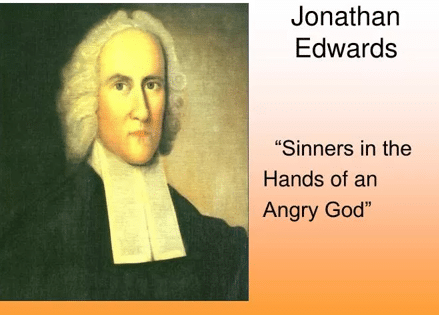
The message of Jonathan Edwards about the wrath of God for unbelieving sinners is the antithesis of many modern day Christian preachers who rarely speak of sin and Hell. But, it is a very important Christian message that is a warning to the modern day church and to all people: Hell is very real and eternal, and faith in Jesus Christ is the only way to salvation.
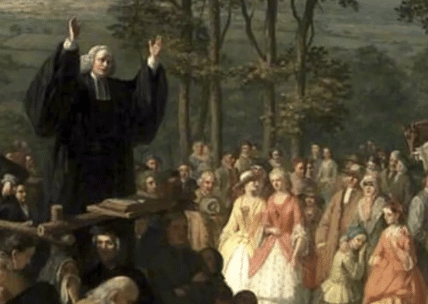
Another great Christian preacher of this time was Rev. George Whitfield, a traveling evangelist. In one year he travelled more than 5,000 miles and preached more than 350 times.
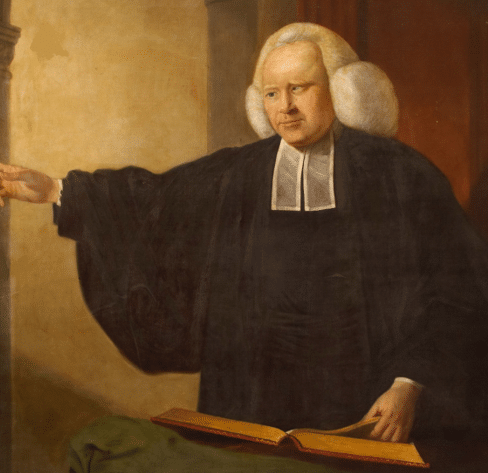
Thousands gathered to his preaching which was very charismatic. His crowds were so large that churches could not contain them, and they were held in open fields. Some 30,000 people attended one service. Whitfield implored the people that they must repent of sin, make Jesus Lord and Savior and be “born again” to be saved from Hell and spend eternity with God. He preached in a very emotional and persuasive manner, shouting Scripture and crying. He eschewed the formal rituals and liturgy of the Church of England. Rev. Whitefield gave more than 15,000 sermons, and his impact upon the American colonies was very significant. Whitfield accompanied Benjamin Franklin to England to protest the Stamp Act of 1765 and was one of the first Colonial leaders to advocate independence from England.
The Great Awakening radically changed the religious climate in the American colonies and actually altered the culture. Church membership grew greatly, and denominational boundaries became less important. The revival led to the creation of many universities such as Princeton, Rutgers, Brown and Dartmouth. The founding creed of these universities was faith in Jesus Christ, and the Gospel of salvation. Sadly, many of these colleges have now departed from the faith. The Great Awakening also was a catalyst for the American Revolutionary war. As the people grew free from sin, they also desired to be free from government tyranny by England. The preachers of the day were known as the “Black Robe Regiment” who spoke about freedom and self-government from their pulpits. Many were the descendants of the Pilgrims and Puritans who had come to America for religious freedom, and to share the Gospel and create a Godly nation. One prominent member of this group of clergymen was Peter Muhlenberg, who took off his black clergy robes at the end of a sermon to reveal his military uniform. Muhlenberg was later a military officer in the Colonial army and even fought at Yorktown. These clergy preached that God favored their desire for freedom because they were being denied fundamental rights by England. Every right mentioned in the Declaration of Independence and Constitution was first mentioned by the Black Robe Regiment clergy. John Adams said: “The pulpits have thundered.” Another famous member of this brigade was Patrick Henry, who ended one of his sermons with “As for me, give me liberty or give me death” which became the battle cry for the revolutionary war. And the theme of the Revolutionary War became “No king but Jesus.”
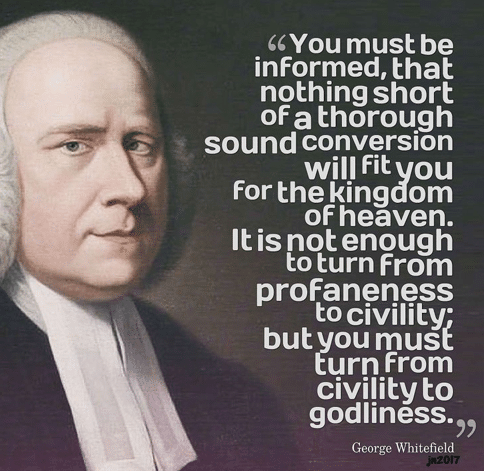
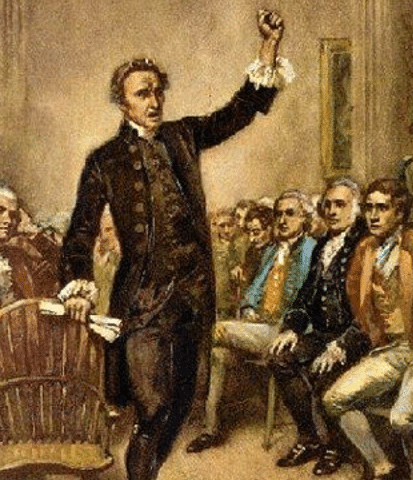
Patrick Henry
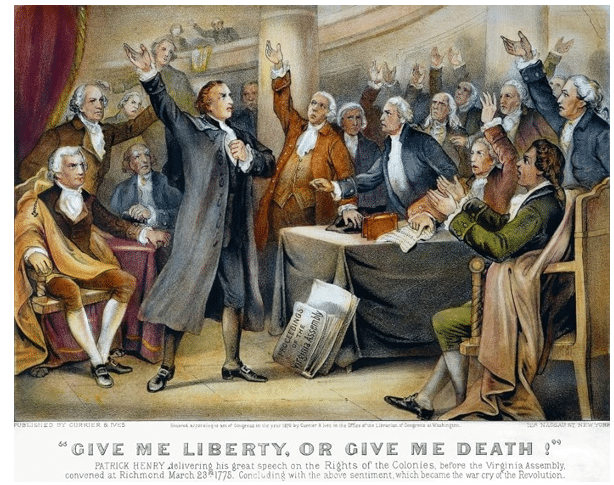
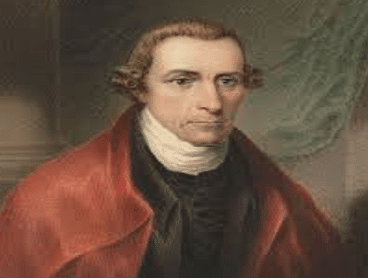
Patrick Henry
ABOUT THE AUTHOR- JUDGE JOHN MARSHALL MEISBURG, JR.
Judge John Marshall Meisburg, Jr., was a U.S. Administrative Law Judge with the Social Security Administration for 26 years in Jacksonville, Florida. He retired as a judge in 2021 and is now living in Fernandina Beach, Florida with his wife of 43 years, Dr. Denise Meisburg. They have six children and 11 grandchildren. Prior to being a judge, he was a lawyer with the Federal government for 23 years, serving in all three branches of the government, with the U.S. District Court, EEOC, Justice Department, Congress, FDIC and Office of Special Counsel (MSPB). He was in private law practice one year in Washington, D.C. and filed the lawsuit that became the landmark U.S. Supreme Court case on sexual harassment. He holds a Bachelor of Arts in Political Science from the University of Kentucky, and a Juris Doctor law degree from the University of Kentucky College of Law. He is a lifelong Christian, being raised in the Baptist faith in Louisville, Kentucky. He was an Elder at New Life Christian Fellowship in Jacksonville where he taught Sunday School, the Jewish Roots of the Faith and the Christian Heritage of America. He was a leader of both the National Day of Prayer and the House of Prayer in Jacksonville for over ten years. He has published ten books relating to Christian and legal ssues. He is now a member of Living Waters World Outreach Center in Fernandina Beach, where he serves in the prayer and home group ministry, and is a member of the Board of Directors for Faith Christian Academy.
Christian Heritage Articles:
“Christopher Columbus – Man of Great Faith and Courage” – Citizens Journal Florida
The Christian Heritage of America (Installment 2) – Citizens Journal Florida
The Christian Heritage of America Installment 3 – The French Huguenots! – Citizens Journal Florida
The views expressed in this commentary are those of the author and do not necessarily reflect the official position of Citizens Journal Florida.









